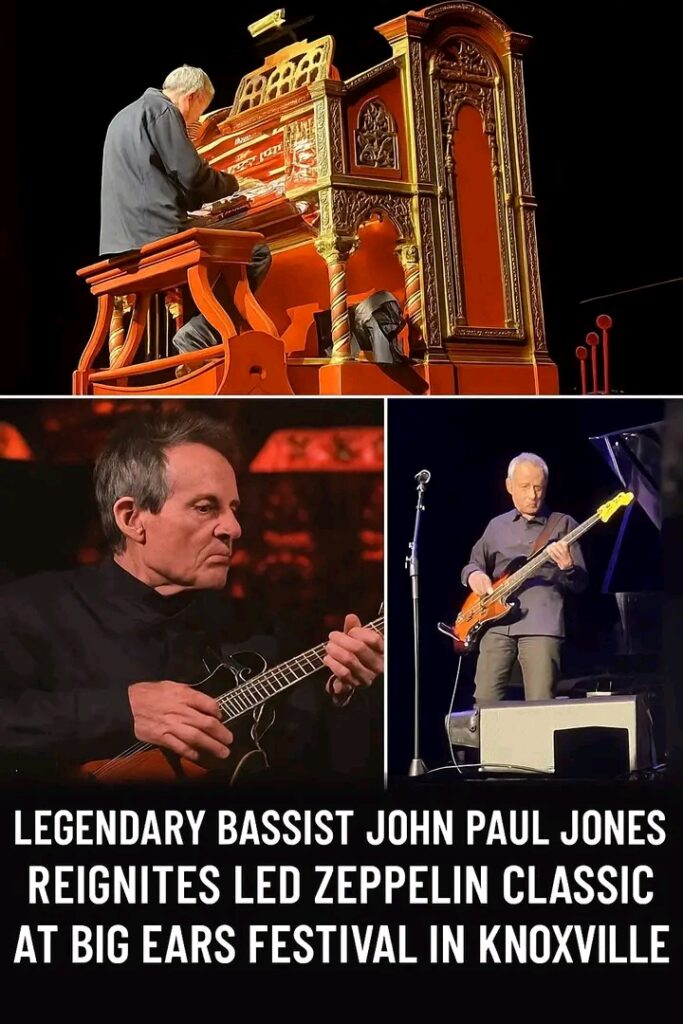In a night that will be etched in rock history, John Paul Jones, the legendary bassist and multi-instrumentalist of Led Zeppelin, delivered a transcendent and genre-defying performance at the Big Ears Festival in Knoxville, Tennessee. Known for its eclectic and avant-garde programming
In a night that will be etched in rock history, John Paul Jones, the legendary bassist and multi-instrumentalist of Led Zeppelin, delivered a transcendent and genre-defying performance at the Big Ears Festival in Knoxville, Tennessee. Known for its eclectic and avant-garde programming, Big Ears became the epicenter of rock nostalgia and musical brilliance as Jones took the stage and reignited classic Zeppelin tracks with masterful flair and innovation.
The 78-year-old Rock & Roll Hall of Famer left the audience awestruck as he wove a sonic tapestry through pipe organ, piano, lap steel guitar, mandolin, and even experimental looping effects. His set — a stunning homage to his Zeppelin roots — included reimagined versions of “Your Time Is Gonna Come,” “No Quarter,” “Going to California,” and more, performed with elegance, soul, and staggering musicianship.
A Journey Through Time and Sound
Held inside Knoxville’s historic Tennessee Theatre, the atmosphere was electric yet reverent as fans — young and old — gathered for what many called a “once-in-a-lifetime” performance. Jones, ever the understated genius, appeared onstage not with a thunderous announcement, but with quiet authority, greeting the audience with a warm nod before sitting behind the cathedral-sized pipe organ.
The haunting opening notes of “Your Time Is Gonna Come” reverberated through the hall, transforming the familiar rock anthem into a hymnal experience, layered with lush harmonics and a spiritual resonance. The crowd sat in silent awe, taking in the moment with visible emotion.
Without uttering a word, Jones transitioned into a jazz-influenced piano rendition of “No Quarter”, one of his most celebrated Zeppelin compositions. He explored the darker textures of the track, introducing ambient soundscapes and melancholy improvisations that felt both familiar and new. The performance built slowly, erupting into a thunderous climax as lights flickered dramatically — mirroring the raw intensity of the original, while pushing it into a new realm.
A Multi-Instrumental Masterclass
Switching between instruments with effortless grace, Jones reminded the world why he is not just a bassist, but a true musical architect. Armed with a lap steel guitar, he performed a stripped-down version of “Going to California,” eliciting gasps and applause as he bent notes into mournful cries. The Appalachian setting of Knoxville gave this folk ballad an added layer of poignancy, and the audience responded with a standing ovation before the final note had even faded.
On the mandolin, Jones dipped briefly into other Zeppelin-era pieces, teasing motifs from “The Battle of Evermore” and “Bron-Yr-Aur Stomp.” Each transition was fluid, unexpected, and utterly spellbinding. The performance blurred the line between rock concert, classical recital, and sonic meditation.
A Rare Glimpse of Greatness
While John Paul Jones has remained active in recent years — composing operas, scoring films, and occasionally performing in experimental groups like Them Crooked Vultures — appearances featuring Led Zeppelin material are exceedingly rare. The Big Ears Festival offered a glimpse not just into Jones’ enduring brilliance, but into the timeless legacy of Led Zeppelin itself.
Festival organizer Ashley Capps said in a post-show interview:
“Having John Paul Jones here was like summoning a god of music. He didn’t just play — he cast a spell. This was a gift to all who were lucky enough to witness it.”
Fans echoed this sentiment, with social media flooding with praise and footage. One attendee tweeted, “I just saw a Led Zeppelin song played on a pipe organ and mandolin by John Paul Jones himself… and I may never recover. Unreal.”
The Legacy Continues
Jones offered no commentary on a possible tour or further Zeppelin-centered performances, but the evening felt significant — almost like a farewell letter to his fans, and a reminder of his invaluable contribution to music history.
As the final notes echoed through the Tennessee Theatre, the crowd rose again, giving the icon an extended standing ovation. John Paul Jones bowed humbly, smiled, and exited the stage — leaving behind a hall full of tears, applause, and the kind of magic that only happens once.
In an era of fleeting fame and digital gimmicks, John Paul Jones reminded the world that true greatness is timeless.
And on that night in Knoxville, he didn’t just play Led Zeppelin songs.
He elevated them to something even more profound.
